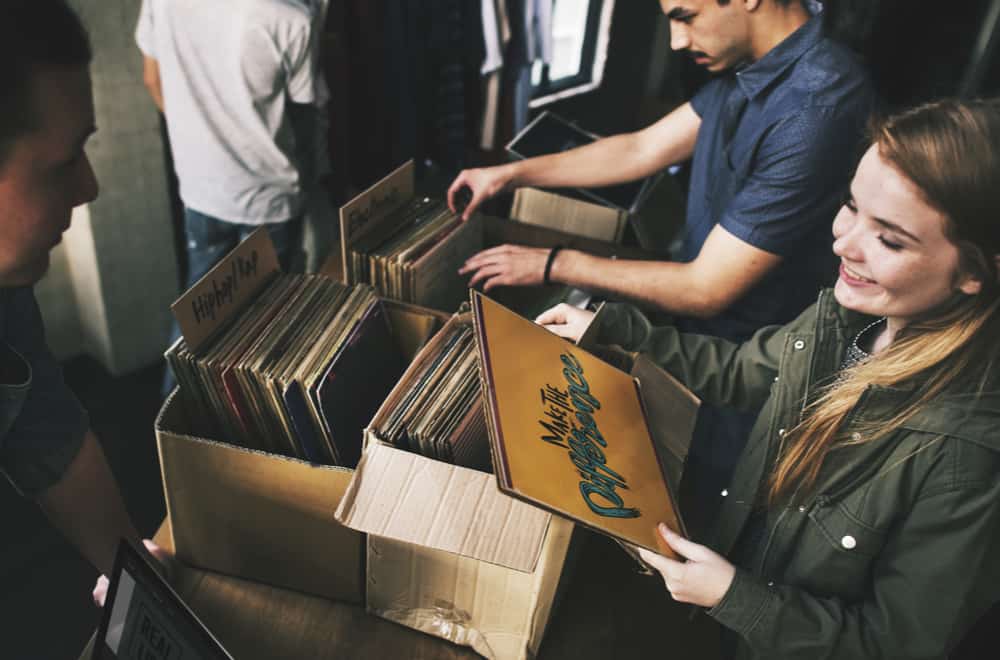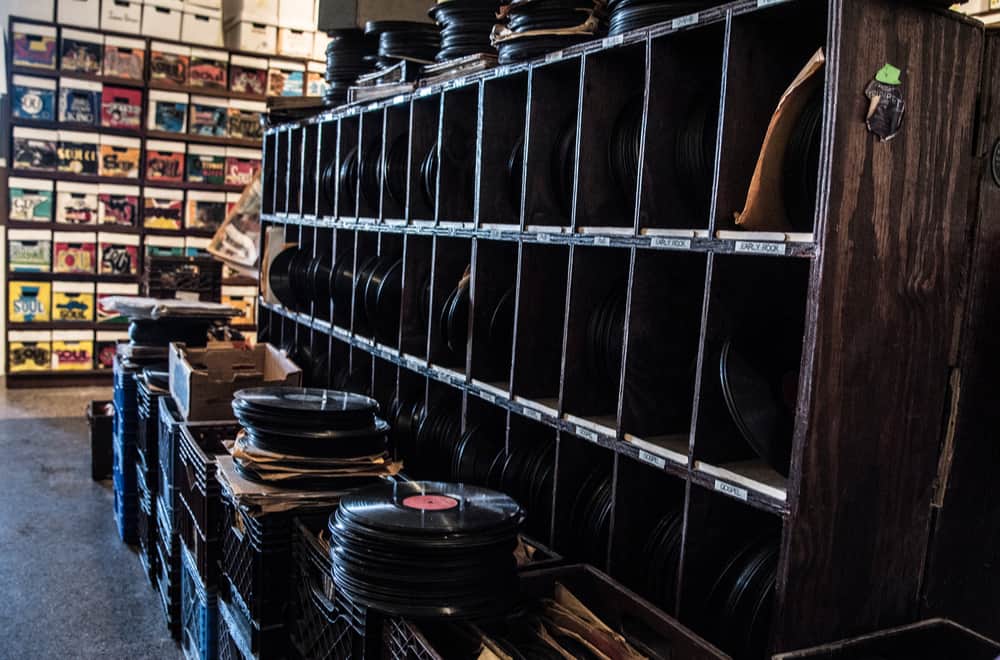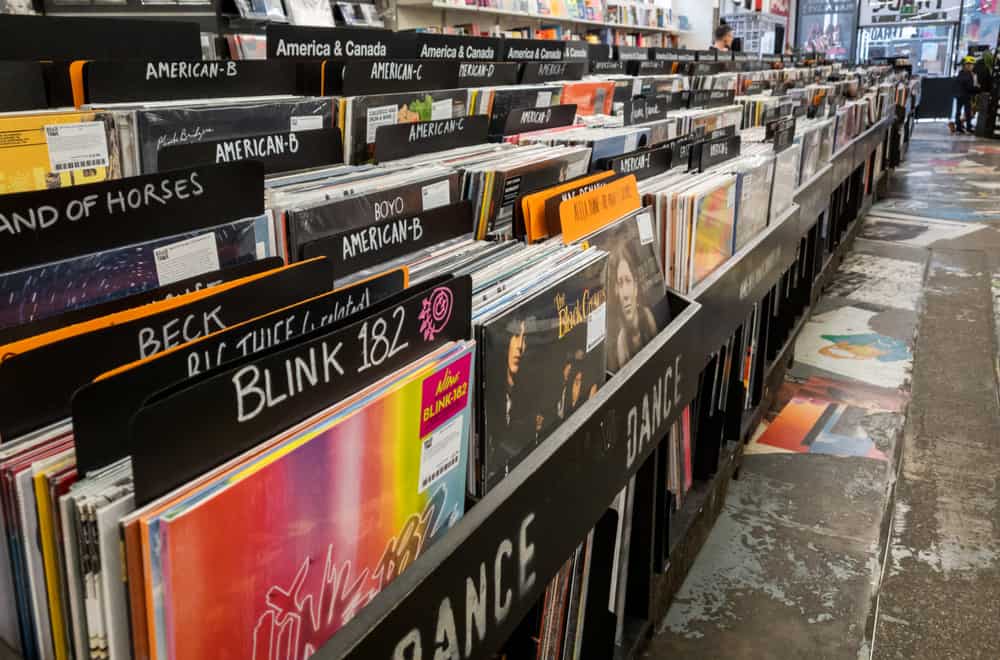Vinyl records are valuables that can be passed down from generation to generation as families and their loved ones share the best music of their time.
But vinyl is fragile and without proper storage, the records can get scratched, scuffed, or dented, causing them to crackle, skip songs, or even refuse to play.
Unfortunately, once the damage is done, it can’t be undone. But you can prevent it by storing your discs right and taking good care of them. We have outlined below easy steps and tips on how to store vinyl records that we thought could help. Keep reading.
Table of Contents
Best way to store vinyl records
Storing vinyl records incorrectly could severely affect their playability and lower their value. Use the following steps to keep your discs in pristine condition and sounding good for generations to come.
1: Slip Records in Double Sleeves for Storage
In order to store your vinyl records properly, you will need both an inner and outer sleeve. The inner sleeve will wrap the disc before it is placed in its casing and the outer sleeve will enclose the casing. You can find sleeves in any music store or online retailers like eBay and Amazon.
Having an inner sleeve, especially, is an important step in the storage of vinyl records because it helps maintain their quality. However, for any sleeve to achieve this purpose, it must be smooth and silky to keep the disc from scratches.
Avoid buying cheap, low-quality inner sleeves, especially those that are paper-like. These will slowly scratch the surface of the disc, affecting its playability over time.
Cheap outer sleeves will typically not lower the quality of the disc, but some sleeves like those made from polypropylene, for instance, may fade with continued use.
In addition to choosing appropriate material, you also need to make sure the sleeve is the right size. Mostly, vinyl records will require 7 inches, 10 inches, or 12 inches sleeves. Choose the size that best fits your specific discs.
Usually, vinyl records will come enclosed in a case. To store a disc the right way, remove it from its casing and put it in one of your inner sleeves. Some records may come sealed with a protective film. Leave this on and gently put the record back in its casing, then put the casing in an outer sleeve. Check to see the open sides of both the sleeve and the record case are lined up.
Tips for Caring for Vinyl Records Stored in Sleeves
- Vinyl record sleeves are prone to general wear and tear and depending on the environment, sometimes they can also develop mold and mildew. Replace any damaged or moldy sleeves to enhance the protection of your records.
- Avoid touching the inside of the disc when you take it out to play. Messy handling of the record grooves can transfer dirt, oils, and grease onto the disc, affecting its playability. Instead, hold the record by its center circle and edges.
2: Display on a Shelf of Store in a Box
Where to store your vinyl records after you have safely put them in their sleeves will be totally up to you.
If you would like to show off your collection, buy a display shelf and organize everything on there. Shelving is also the best way to store records that you play often, as they can be easy to access.
Consider those with short columns and long, horizontal rows. Also, make sure the columns are 2 to 3 inches taller than the size of your largest record. This will allow you to store more discs in one column.
If you don’t have enough room to set up a shelf or just want to put your vinyl records away, get storage boxes and arrange your discs in them. Plastic tubs and wooden crates are a quick, cheap solution that would work great.
But if you don’t mind spending a few more bucks, you can check out archival plastic storage boxes. And just like shelving, make sure your boxes are taller than your largest disc by about 2 to 3 inches.
Tips for Storing Vinyl Record On a Shelf or In a Box
- Make sure you are storing your vinyl records vertically. Do not stack them over each other, as the weight distributed by the discs can cause those at the bottom to warp or scratch over time. Do not place heavy items on top of the discs either.
- Avoid leaving a record on the player for prolonged periods. When not in use, keep all discs sealed inside their cases and put them back on the shelf or storage boxes. Exposing your vinyl records to indoor air for too long can cause them to collect dust, which can result in scratches.
3: Choose an Appropriate Environment for Your Vinyl Records’ Storage
Whether you choose to display your vinyl records on a shelf or archive them away in a storage box, the surrounding environment must be favorable for the discs. Here are some of the things that can affect your record’s storage environment:
Sunlight: Vinyl records are susceptible to UV light and can get damaged in just a few minutes. The sunlight can also cause record cases to fade. Therefore, do not build your display shelf or put your storage boxes in direct sunlight or near a bright window.
Extreme heat or cold: If you store your records at a place that is too hot, the vinyl will expand and the disc will warp around the edges, becoming unplayable. Similarly, if the area is too cold, the discs will become weak and brittle, causing them to break. It is important that you store your records slightly below room temperature. 52°F would be ideal for most vinyl.
If by any chance you leave your records in extreme cold for too long, raise the temperature of your storage area gradually. You don’t want to suddenly shift from cold to hot, as this may cause an abrupt expansion of the disc, which could damage it.
Humidity: High humidity rooms or those with water leaks can cause your vinyl records to develop mold. Examples of such places are basements, garages, sheds, and attics, and unless they are completely sealed, you should not store your discs in them. Only keep your albums in 32% room humidity or lower.
Dust: Storing your records in a dusty room can cause them to become dirty, making them difficult to play. As such, avoid exposing the records to the open air and keep them packed closely together so that only the cover edges are exposed to dust. Also, to keep your disks in good shape, plan to dust the edges at least once a week.
Water: While vinyl itself is resistant to water damage, the record covers are not and will get damaged if you store the disks in a wet area. Inspect your room for water leaks before setting up your display shelf or bringing in your boxes of records.
Should You Clean Dirty Vinyl Records Before Storage?
Absolutely! If there are visible fingerprints or debris in the grooves of your records, it is important that you clean your discs before putting them away.
If you let the dirt sit, it can work its way too deep into the vinyl, making it difficult to get rid of. And next time you play the record, the dirt will attach itself to the player, causing it not to play the disc properly. This is what causes a lot of skipping and crackling when playing vinyl records.
But cleaning doesn’t mean wiping the disc with the end of your shirt. No matter how smooth the shirt may feel, it could leave behind lint fibers that may scratch and ruin your records.
So, what should you use instead? A vinyl record cleaning brush. Simply swipe the brush over the grooves to get rid of any embedded dust and debris. Use a vinyl record cleaner to get all the dirt out and make sure your discs are completely dry before storing them away. For more information and insights on how to properly clean vinyl records, watch this video.
Tips for Keeping Your Vinyl Records Clean
- Wash your hands with soap before handling your records. Our hands may contain oils, dirt, and sweat that could promote the growth of mold and fungi both on the records and on the sleeves. And when removing or returning discs to their storage, only hold at the edges.
- Keep your player clean and well maintained. Dust it regularly to avoid transferring dirt to your clean vinyl records.
The Takeaway
Vinyl records are not a thing of the past anymore. More and more music lovers are building their collections at home, and as long as new music is coming out every day, there will always be a demand for these discs.
By storing your records in a cool, dry place away from direct sunlight and following other care and maintenance tips shared here, you can ensure your discs stay in tip-top condition and serve you for years and years.


